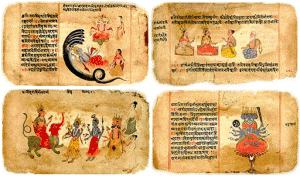VEDA, SMRITI, SRUTI

> YOGA & LIVE SANSKRIT CLASSES <
Śruti (Sanskrit: śrúti, „hearing, listening“) is a term that describes the sacred texts comprising the central canon of Hinduism and is one of the three main sources of dharma and therefore is also influential within Hindu Law. These sacred works span the entire history of Hinduism, beginning with some of the earliest known Hindu texts and ending in the early modern period with the later Upanishads.. Śruti is often cited as akin to the Vedas; however, it also contains various supplementary commentaries on them. This literature differs from other sources of Hindu Law, particularly smṛti or “remembered text”, because of the purely divine origin of śruti. This belief of divinity is particularly prominent within the Mimamsa tradition. The initial literature is traditionally believed to be a direct revelation of the “cosmic sound of truth” heard by ancient Rishis who then translated what was heard into something understandable by humans.
Smṛti (Sanskrit: स्मृति), literally „that which is remembered,“ refers to a specific body of Hindu religious scripture. Smṛti also denotes non-Shruti texts and is generally seen as secondary in authority to Shruti. The literature which comprises the Smriti was composed after the Vedas around 500 BCE. Smriti also denotes tradition in the sense that it portrays the traditions of the rules on dharma, especially those of lawful virtuous persons. This is understood by looking at traditional texts, such as the Ramayana, in which the traditions of the main characters portray a strict adherence to or observance of dharma.
Comments are closed.